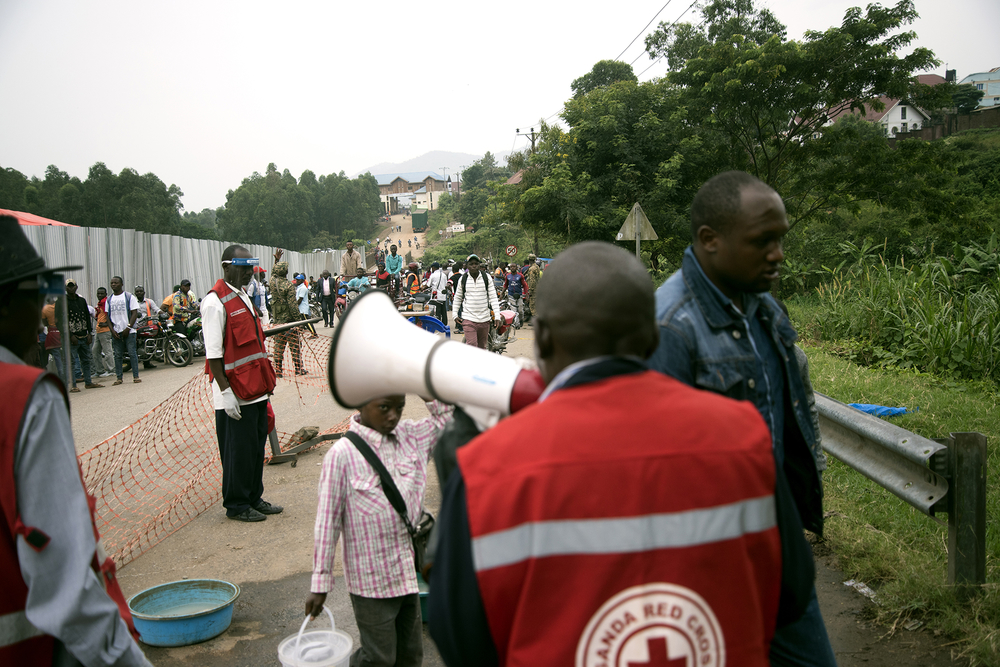Op-Ed: We can’t stop Congo’s Ebola outbreak until communities lead the response, By Amy Daffe
One year into the Ebola outbreak in the Democratic Republic of Congo and the epidemic is accelerating. There have been more new cases in the last three months than the previous nine – an average of 84 new cases a week – and more than 1,700 people have now died.

Ebola’s spread into new and large population centres in northeastern Congo and beyond remains a real fear. Three cases have now been confirmed in previously unaffected Goma, a city of more than two million people and a major transit hub on the border with Rwanda, hundreds of kilometres away from the main Ebola hotspots of Beni and Butembo. Rwanda responded today by closing the border.
Reflecting the mounting anxiety over the disease’s trajectory, the World Health Organisation on 17 July declared the outbreak in Congo’s North Kivu and Ituri provinces a Public Health Emergency of International Concern.
Why is this outbreak proving so difficult to control? We know that community leadership and mobilisation is integral to stopping the spread of the disease, but not enough emphasis is being placed on building community trust and acceptance of the Ebola response. Neither is there enough investment in human capital, or flexible funding to NGOs supporting the response.
This is coupled with a top-down approach to community engagement that hasn’t used the right channels to reach communities.
Instead of working with local leaders, outsiders arrived spreading messages that have left communities with more questions than answers. Information has not been well-tailored to different community contexts nor appropriately adapted to local languages or social norms.
As a result, cases are being hidden in communities and worryingly the contacts of those that die are largely unknown, making tracing difficult. With a 68 percent fatality rate, this Ebola outbreak is among the deadliest ever (the average rate is 50 percent).
Lack of community engagement and knowledge contributes to the lag in referral time. On average it is taking 5.5 days from the onset of symptoms for a suspected case to report to a health facility and more than half of parents are not referring their children.
North Kivu and Ituri are areas steeped in conflict for the past two decades, with scores of different armed groups vying for control. An average person will have fled their home four or five times in their lifetime due to conflict. That makes an effective Ebola response even more challenging.
Building trust
Mistrust of government runs deep in what is an opposition area. The postponement of the presidential election in December 2018 in North Kivu fuelled resistance to the response, with many accusing the government of using Ebola as a pretext for disenfranchising them. The fact that people in Beni and Butembo were then allowed to vote in March 2019, while Ebola still raged, elevated the scepticism over the genesis and genuineness of the disease.
An unstable security situation adds to the complexity of the response. Two Ebola health workers were killed just two weeks ago, and by mid-July this year alone there had been 170 attacks against healthcare facilities or workers. The imposition of fees by armed groups for safe passage on some of the main roads means people find alternative routes, which has an impact on Ebola surveillance. A lot of movement along the Beni-Goma corridor goes untracked.
There are also self-defeating procedures in place that handicap the response. They include a continued lack of direct funding – particularly by donor governments – to NGOs who work in the affected areas and have existing relationships with communities. The current strategy is to fund NGOs through other agencies. Applying for funding through this system can cause delays and reduce the flexibility for NGOs to scale up and respond rapidly where needed.
Furthermore, the way that security is organised for the Ebola response contributes to the erosion of community trust, hampering the ability of all agencies to work effectively. What we need to see – and have been advocating for – is a move to an area-based security framework involving community surveillance rather than the mandated use of escorts. There should be a sufficient number of UN security teams and first-responders in the areas we operate in rather than point security for compounds and foot traffic and vehicle movements, which only serves to widen the gulf between communities and responders.
Effective community mobilisation requires financial support to communities at risk and an investment in human capital – starting with a senior level person whose responsibility would be to advocate for, and ensure that community engagement is a cross-cutting element of the response, complementing the activities of all agencies involved.
A key barrier is the 25 percent cap on staffing costs imposed by some donors – which means agencies cannot put in place the staffing structure that is needed for an effective response, which includes large-scale community mobilisation.
Engaging rather than alienating
In the West Africa Ebola outbreak of 2015, Mercy Corps led a huge social mobilisation campaignacross Liberia, which reached 2.4 million people – more than half the population. We could only do that because we brought on board 77 partner organisations and 15,000 community communicators.
That campaign led to significant changes in attitudes. It taught us the importance of sharing the right type of information in the right way. “It helped us to understand the messaging because they sit with us to discuss and make us understand that Ebola is real,” one community participant explained.
We are only going to succeed in stopping the expansion of this epidemic by treating the communities as partners, drawing upon existing community level structures and resources (not creating parallel local structures), and mapping community dynamics – knowing who is influential and can help sway opinion.
One practical example is Mercy Corps’ ongoing Vision Ebola Zero programme launched in Goma in March 2019, which draws on our existing community network of volunteers. It has already reached more than 50,000 people with factual, practical information about Ebola, delivered by people the community know.
We need to engage local leadership, including local chiefs, and bring community groups on board with community conversations targeting caretakers and groups vulnerable to the virus, and train them on the use of education materials, early warning mechanisms, and conflict rumour resolution.
We know that Ebola is endemic in Congo. The systems and awareness we establish now will not only saves lives currently but also in the years to come.
Only when communities are at the forefront of the response – with preparation, training, tools, support and funding – will we be able to end this epidemic.












